Organisational Behaviour Report: Unilever Case Study Analysis
VerifiedAdded on 2023/06/05
|14
|4639
|464
Report
AI Summary
This report provides a comprehensive analysis of organisational behaviour, focusing on the influence of culture, politics, and power on individual and team behaviour and performance, using Unilever as a case study. It evaluates content and process theories of motivation and motivational techniques, examining their effectiveness in achieving organisational goals. The report also explores team dynamics, comparing effective and ineffective teams, and applies organisational behaviour concepts and philosophies within the context of Unilever's business situation. Furthermore, it critically assesses the relevance of team development theories and their impact on workplace behaviour, aiming to improve business performance and productivity, ultimately providing justified recommendations for organisational success.
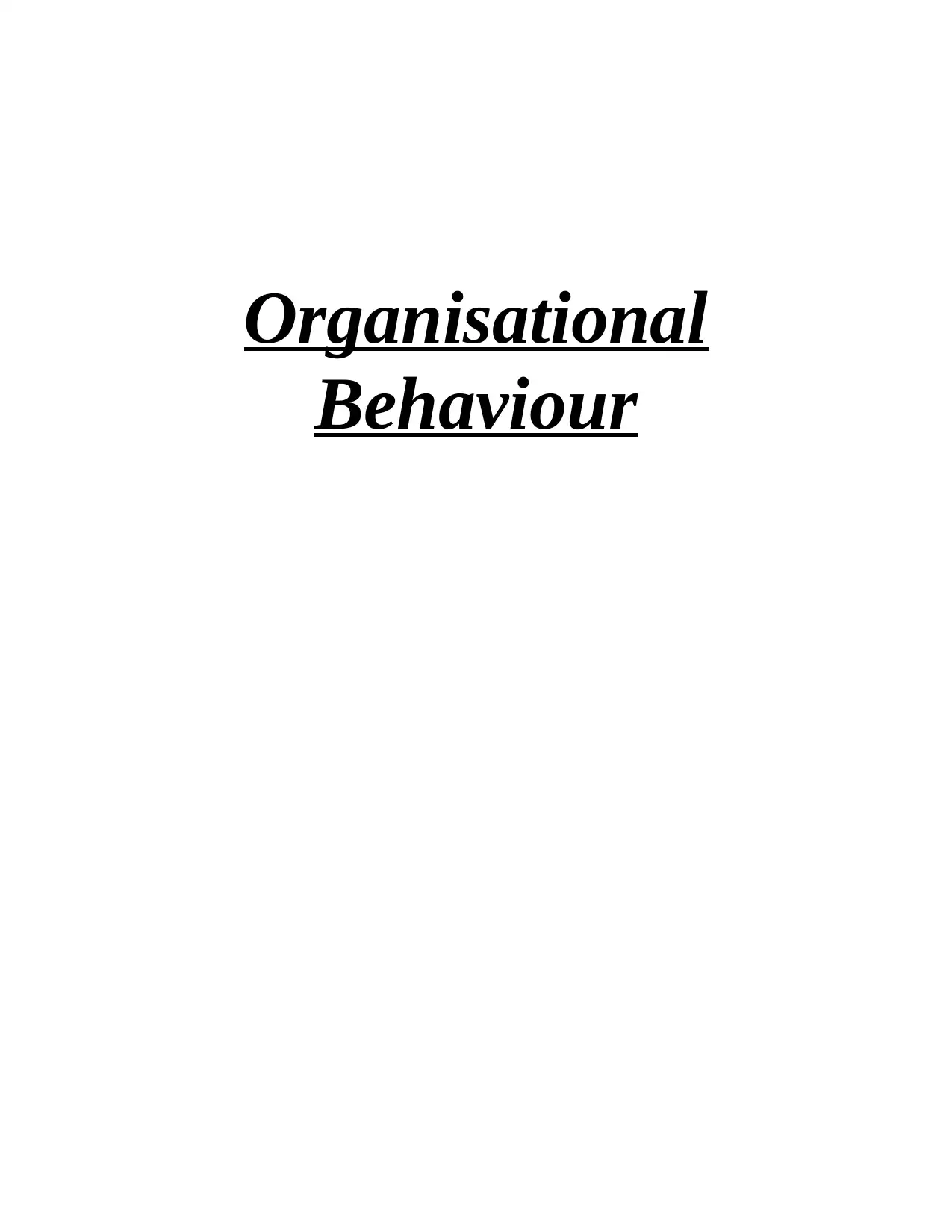
Organisational
Behaviour
Behaviour
Paraphrase This Document
Need a fresh take? Get an instant paraphrase of this document with our AI Paraphraser
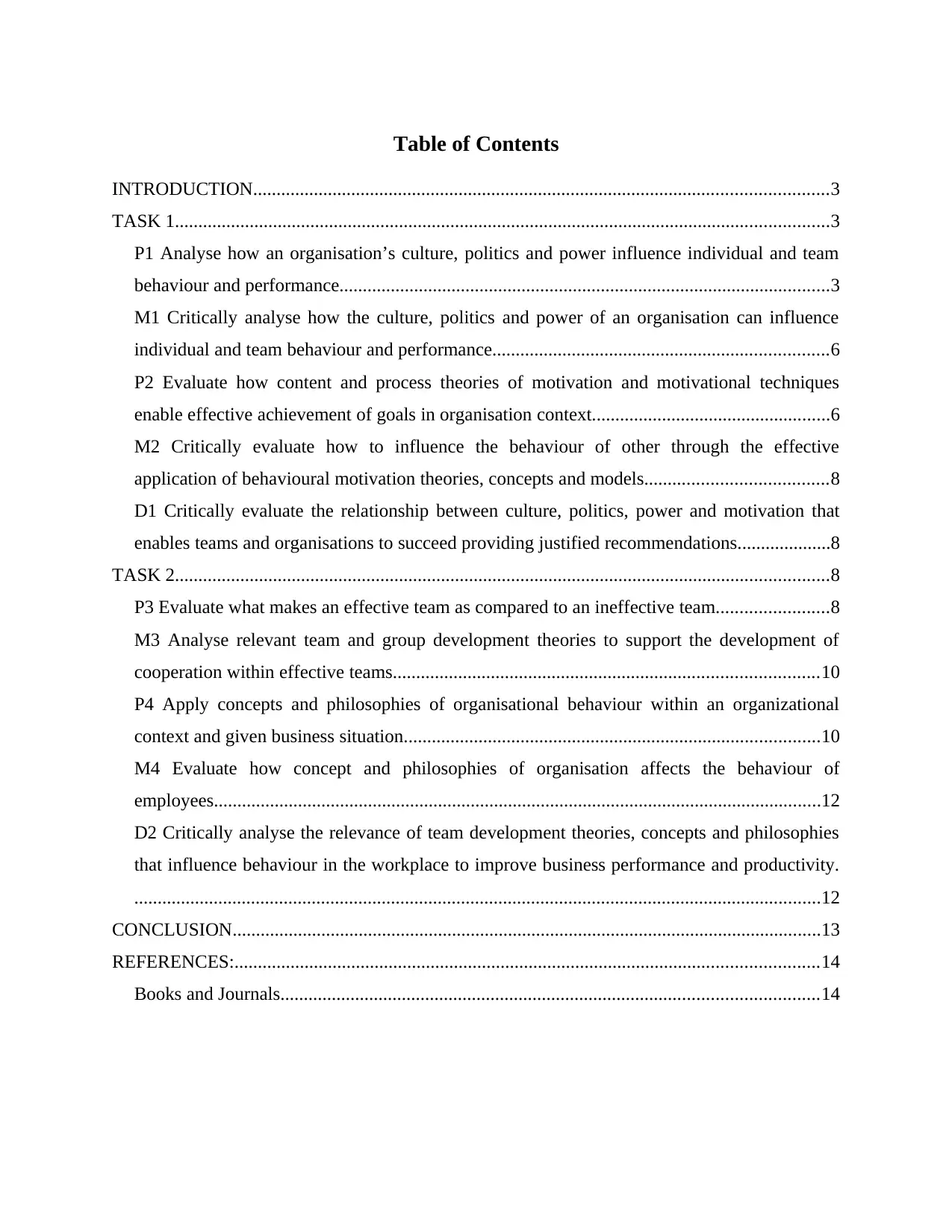
Table of Contents
INTRODUCTION...........................................................................................................................3
TASK 1............................................................................................................................................3
P1 Analyse how an organisation’s culture, politics and power influence individual and team
behaviour and performance.........................................................................................................3
M1 Critically analyse how the culture, politics and power of an organisation can influence
individual and team behaviour and performance........................................................................6
P2 Evaluate how content and process theories of motivation and motivational techniques
enable effective achievement of goals in organisation context...................................................6
M2 Critically evaluate how to influence the behaviour of other through the effective
application of behavioural motivation theories, concepts and models.......................................8
D1 Critically evaluate the relationship between culture, politics, power and motivation that
enables teams and organisations to succeed providing justified recommendations....................8
TASK 2............................................................................................................................................8
P3 Evaluate what makes an effective team as compared to an ineffective team........................8
M3 Analyse relevant team and group development theories to support the development of
cooperation within effective teams...........................................................................................10
P4 Apply concepts and philosophies of organisational behaviour within an organizational
context and given business situation.........................................................................................10
M4 Evaluate how concept and philosophies of organisation affects the behaviour of
employees..................................................................................................................................12
D2 Critically analyse the relevance of team development theories, concepts and philosophies
that influence behaviour in the workplace to improve business performance and productivity.
...................................................................................................................................................12
CONCLUSION..............................................................................................................................13
REFERENCES:.............................................................................................................................14
Books and Journals...................................................................................................................14
INTRODUCTION...........................................................................................................................3
TASK 1............................................................................................................................................3
P1 Analyse how an organisation’s culture, politics and power influence individual and team
behaviour and performance.........................................................................................................3
M1 Critically analyse how the culture, politics and power of an organisation can influence
individual and team behaviour and performance........................................................................6
P2 Evaluate how content and process theories of motivation and motivational techniques
enable effective achievement of goals in organisation context...................................................6
M2 Critically evaluate how to influence the behaviour of other through the effective
application of behavioural motivation theories, concepts and models.......................................8
D1 Critically evaluate the relationship between culture, politics, power and motivation that
enables teams and organisations to succeed providing justified recommendations....................8
TASK 2............................................................................................................................................8
P3 Evaluate what makes an effective team as compared to an ineffective team........................8
M3 Analyse relevant team and group development theories to support the development of
cooperation within effective teams...........................................................................................10
P4 Apply concepts and philosophies of organisational behaviour within an organizational
context and given business situation.........................................................................................10
M4 Evaluate how concept and philosophies of organisation affects the behaviour of
employees..................................................................................................................................12
D2 Critically analyse the relevance of team development theories, concepts and philosophies
that influence behaviour in the workplace to improve business performance and productivity.
...................................................................................................................................................12
CONCLUSION..............................................................................................................................13
REFERENCES:.............................................................................................................................14
Books and Journals...................................................................................................................14
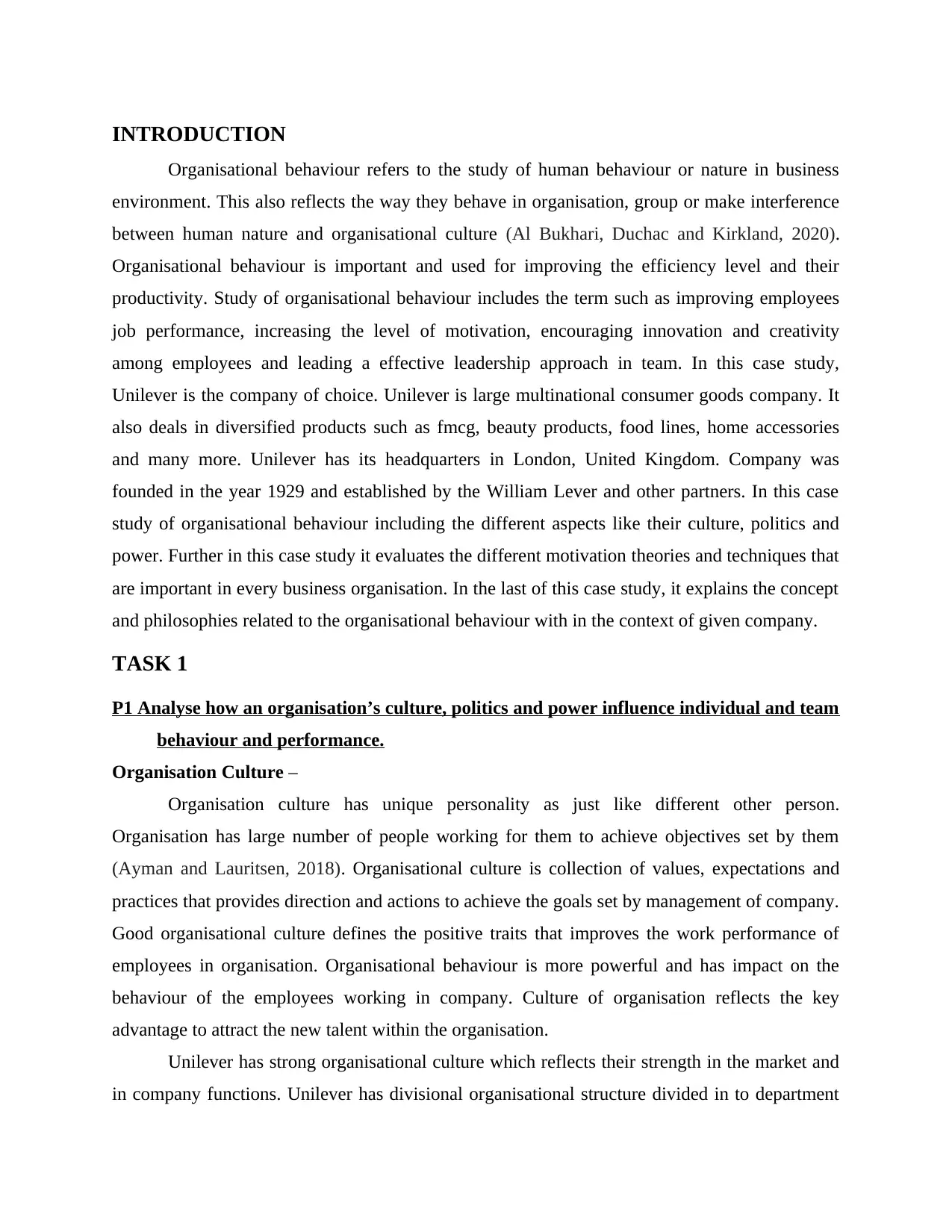
INTRODUCTION
Organisational behaviour refers to the study of human behaviour or nature in business
environment. This also reflects the way they behave in organisation, group or make interference
between human nature and organisational culture (Al Bukhari, Duchac and Kirkland, 2020).
Organisational behaviour is important and used for improving the efficiency level and their
productivity. Study of organisational behaviour includes the term such as improving employees
job performance, increasing the level of motivation, encouraging innovation and creativity
among employees and leading a effective leadership approach in team. In this case study,
Unilever is the company of choice. Unilever is large multinational consumer goods company. It
also deals in diversified products such as fmcg, beauty products, food lines, home accessories
and many more. Unilever has its headquarters in London, United Kingdom. Company was
founded in the year 1929 and established by the William Lever and other partners. In this case
study of organisational behaviour including the different aspects like their culture, politics and
power. Further in this case study it evaluates the different motivation theories and techniques that
are important in every business organisation. In the last of this case study, it explains the concept
and philosophies related to the organisational behaviour with in the context of given company.
TASK 1
P1 Analyse how an organisation’s culture, politics and power influence individual and team
behaviour and performance.
Organisation Culture –
Organisation culture has unique personality as just like different other person.
Organisation has large number of people working for them to achieve objectives set by them
(Ayman and Lauritsen, 2018). Organisational culture is collection of values, expectations and
practices that provides direction and actions to achieve the goals set by management of company.
Good organisational culture defines the positive traits that improves the work performance of
employees in organisation. Organisational behaviour is more powerful and has impact on the
behaviour of the employees working in company. Culture of organisation reflects the key
advantage to attract the new talent within the organisation.
Unilever has strong organisational culture which reflects their strength in the market and
in company functions. Unilever has divisional organisational structure divided in to department
Organisational behaviour refers to the study of human behaviour or nature in business
environment. This also reflects the way they behave in organisation, group or make interference
between human nature and organisational culture (Al Bukhari, Duchac and Kirkland, 2020).
Organisational behaviour is important and used for improving the efficiency level and their
productivity. Study of organisational behaviour includes the term such as improving employees
job performance, increasing the level of motivation, encouraging innovation and creativity
among employees and leading a effective leadership approach in team. In this case study,
Unilever is the company of choice. Unilever is large multinational consumer goods company. It
also deals in diversified products such as fmcg, beauty products, food lines, home accessories
and many more. Unilever has its headquarters in London, United Kingdom. Company was
founded in the year 1929 and established by the William Lever and other partners. In this case
study of organisational behaviour including the different aspects like their culture, politics and
power. Further in this case study it evaluates the different motivation theories and techniques that
are important in every business organisation. In the last of this case study, it explains the concept
and philosophies related to the organisational behaviour with in the context of given company.
TASK 1
P1 Analyse how an organisation’s culture, politics and power influence individual and team
behaviour and performance.
Organisation Culture –
Organisation culture has unique personality as just like different other person.
Organisation has large number of people working for them to achieve objectives set by them
(Ayman and Lauritsen, 2018). Organisational culture is collection of values, expectations and
practices that provides direction and actions to achieve the goals set by management of company.
Good organisational culture defines the positive traits that improves the work performance of
employees in organisation. Organisational behaviour is more powerful and has impact on the
behaviour of the employees working in company. Culture of organisation reflects the key
advantage to attract the new talent within the organisation.
Unilever has strong organisational culture which reflects their strength in the market and
in company functions. Unilever has divisional organisational structure divided in to department
⊘ This is a preview!⊘
Do you want full access?
Subscribe today to unlock all pages.

Trusted by 1+ million students worldwide
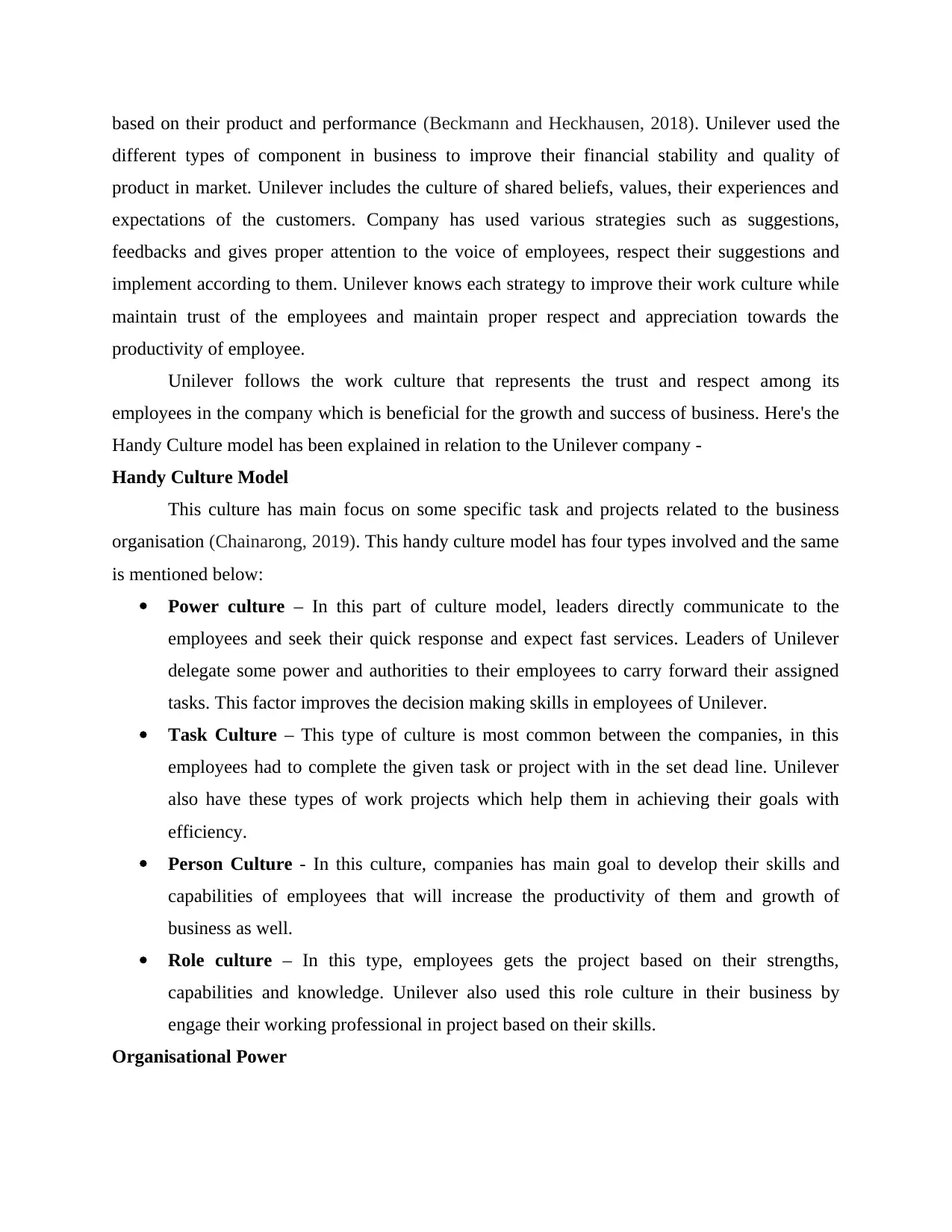
based on their product and performance (Beckmann and Heckhausen, 2018). Unilever used the
different types of component in business to improve their financial stability and quality of
product in market. Unilever includes the culture of shared beliefs, values, their experiences and
expectations of the customers. Company has used various strategies such as suggestions,
feedbacks and gives proper attention to the voice of employees, respect their suggestions and
implement according to them. Unilever knows each strategy to improve their work culture while
maintain trust of the employees and maintain proper respect and appreciation towards the
productivity of employee.
Unilever follows the work culture that represents the trust and respect among its
employees in the company which is beneficial for the growth and success of business. Here's the
Handy Culture model has been explained in relation to the Unilever company -
Handy Culture Model
This culture has main focus on some specific task and projects related to the business
organisation (Chainarong, 2019). This handy culture model has four types involved and the same
is mentioned below:
Power culture – In this part of culture model, leaders directly communicate to the
employees and seek their quick response and expect fast services. Leaders of Unilever
delegate some power and authorities to their employees to carry forward their assigned
tasks. This factor improves the decision making skills in employees of Unilever.
Task Culture – This type of culture is most common between the companies, in this
employees had to complete the given task or project with in the set dead line. Unilever
also have these types of work projects which help them in achieving their goals with
efficiency.
Person Culture - In this culture, companies has main goal to develop their skills and
capabilities of employees that will increase the productivity of them and growth of
business as well.
Role culture – In this type, employees gets the project based on their strengths,
capabilities and knowledge. Unilever also used this role culture in their business by
engage their working professional in project based on their skills.
Organisational Power
different types of component in business to improve their financial stability and quality of
product in market. Unilever includes the culture of shared beliefs, values, their experiences and
expectations of the customers. Company has used various strategies such as suggestions,
feedbacks and gives proper attention to the voice of employees, respect their suggestions and
implement according to them. Unilever knows each strategy to improve their work culture while
maintain trust of the employees and maintain proper respect and appreciation towards the
productivity of employee.
Unilever follows the work culture that represents the trust and respect among its
employees in the company which is beneficial for the growth and success of business. Here's the
Handy Culture model has been explained in relation to the Unilever company -
Handy Culture Model
This culture has main focus on some specific task and projects related to the business
organisation (Chainarong, 2019). This handy culture model has four types involved and the same
is mentioned below:
Power culture – In this part of culture model, leaders directly communicate to the
employees and seek their quick response and expect fast services. Leaders of Unilever
delegate some power and authorities to their employees to carry forward their assigned
tasks. This factor improves the decision making skills in employees of Unilever.
Task Culture – This type of culture is most common between the companies, in this
employees had to complete the given task or project with in the set dead line. Unilever
also have these types of work projects which help them in achieving their goals with
efficiency.
Person Culture - In this culture, companies has main goal to develop their skills and
capabilities of employees that will increase the productivity of them and growth of
business as well.
Role culture – In this type, employees gets the project based on their strengths,
capabilities and knowledge. Unilever also used this role culture in their business by
engage their working professional in project based on their skills.
Organisational Power
Paraphrase This Document
Need a fresh take? Get an instant paraphrase of this document with our AI Paraphraser
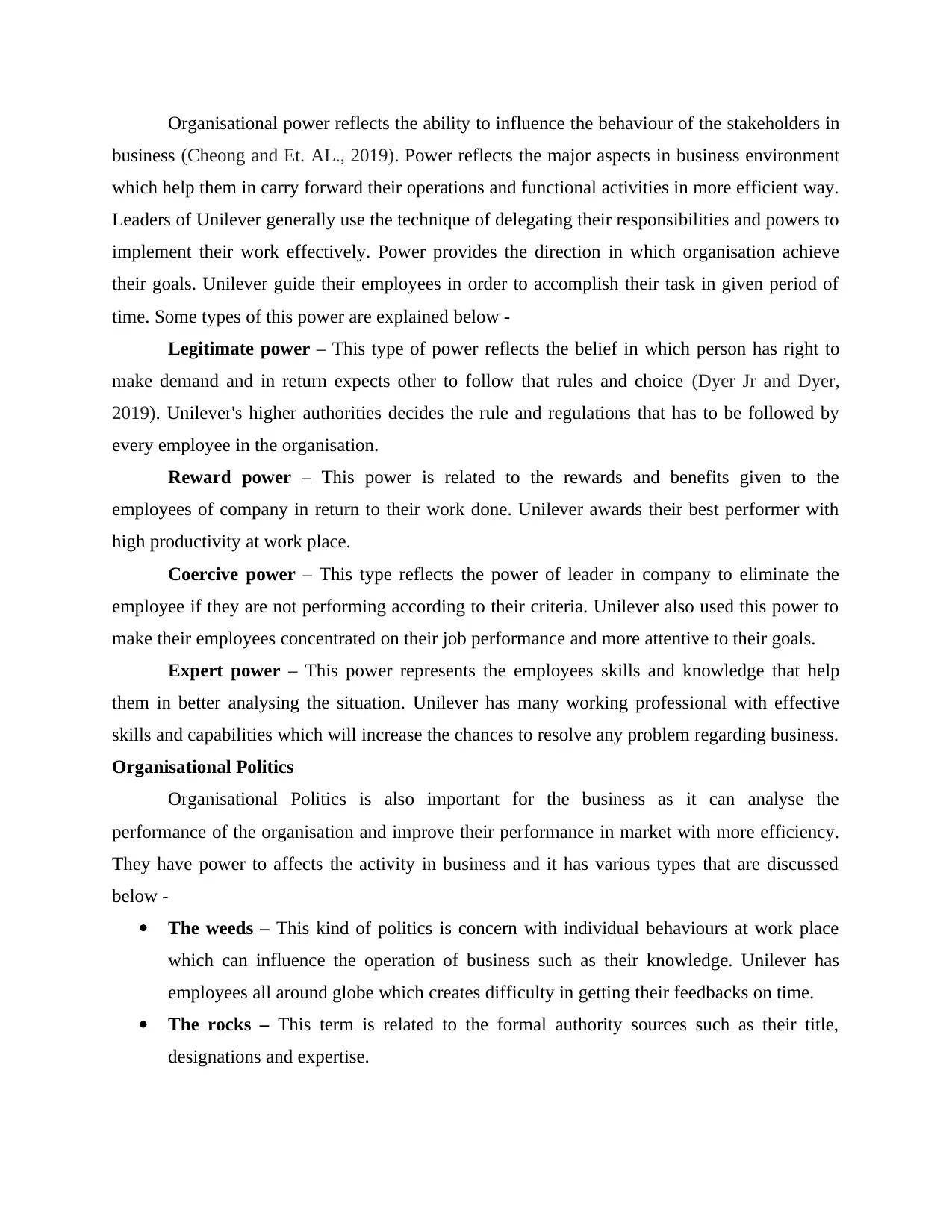
Organisational power reflects the ability to influence the behaviour of the stakeholders in
business (Cheong and Et. AL., 2019). Power reflects the major aspects in business environment
which help them in carry forward their operations and functional activities in more efficient way.
Leaders of Unilever generally use the technique of delegating their responsibilities and powers to
implement their work effectively. Power provides the direction in which organisation achieve
their goals. Unilever guide their employees in order to accomplish their task in given period of
time. Some types of this power are explained below -
Legitimate power – This type of power reflects the belief in which person has right to
make demand and in return expects other to follow that rules and choice (Dyer Jr and Dyer,
2019). Unilever's higher authorities decides the rule and regulations that has to be followed by
every employee in the organisation.
Reward power – This power is related to the rewards and benefits given to the
employees of company in return to their work done. Unilever awards their best performer with
high productivity at work place.
Coercive power – This type reflects the power of leader in company to eliminate the
employee if they are not performing according to their criteria. Unilever also used this power to
make their employees concentrated on their job performance and more attentive to their goals.
Expert power – This power represents the employees skills and knowledge that help
them in better analysing the situation. Unilever has many working professional with effective
skills and capabilities which will increase the chances to resolve any problem regarding business.
Organisational Politics
Organisational Politics is also important for the business as it can analyse the
performance of the organisation and improve their performance in market with more efficiency.
They have power to affects the activity in business and it has various types that are discussed
below -
The weeds – This kind of politics is concern with individual behaviours at work place
which can influence the operation of business such as their knowledge. Unilever has
employees all around globe which creates difficulty in getting their feedbacks on time.
The rocks – This term is related to the formal authority sources such as their title,
designations and expertise.
business (Cheong and Et. AL., 2019). Power reflects the major aspects in business environment
which help them in carry forward their operations and functional activities in more efficient way.
Leaders of Unilever generally use the technique of delegating their responsibilities and powers to
implement their work effectively. Power provides the direction in which organisation achieve
their goals. Unilever guide their employees in order to accomplish their task in given period of
time. Some types of this power are explained below -
Legitimate power – This type of power reflects the belief in which person has right to
make demand and in return expects other to follow that rules and choice (Dyer Jr and Dyer,
2019). Unilever's higher authorities decides the rule and regulations that has to be followed by
every employee in the organisation.
Reward power – This power is related to the rewards and benefits given to the
employees of company in return to their work done. Unilever awards their best performer with
high productivity at work place.
Coercive power – This type reflects the power of leader in company to eliminate the
employee if they are not performing according to their criteria. Unilever also used this power to
make their employees concentrated on their job performance and more attentive to their goals.
Expert power – This power represents the employees skills and knowledge that help
them in better analysing the situation. Unilever has many working professional with effective
skills and capabilities which will increase the chances to resolve any problem regarding business.
Organisational Politics
Organisational Politics is also important for the business as it can analyse the
performance of the organisation and improve their performance in market with more efficiency.
They have power to affects the activity in business and it has various types that are discussed
below -
The weeds – This kind of politics is concern with individual behaviours at work place
which can influence the operation of business such as their knowledge. Unilever has
employees all around globe which creates difficulty in getting their feedbacks on time.
The rocks – This term is related to the formal authority sources such as their title,
designations and expertise.
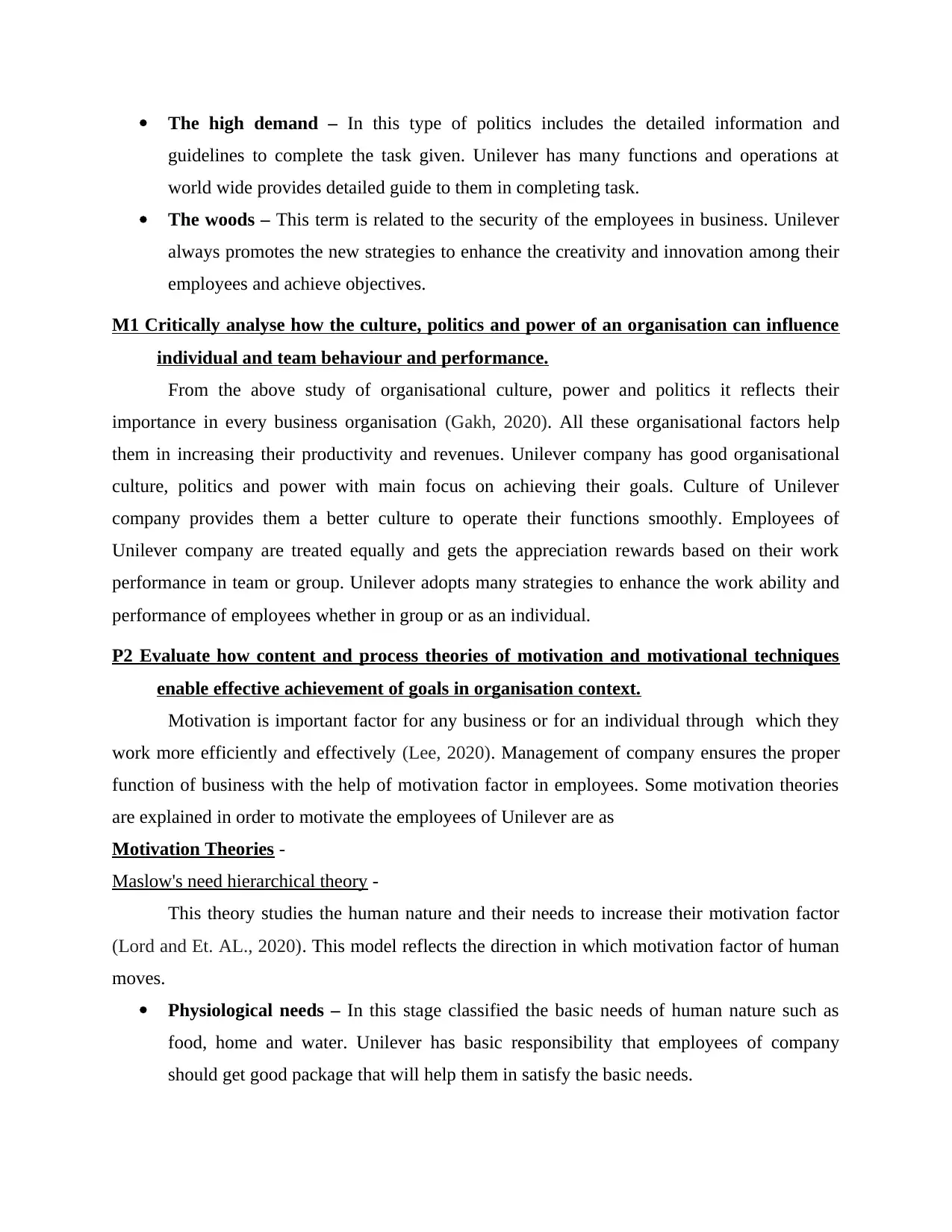
The high demand – In this type of politics includes the detailed information and
guidelines to complete the task given. Unilever has many functions and operations at
world wide provides detailed guide to them in completing task.
The woods – This term is related to the security of the employees in business. Unilever
always promotes the new strategies to enhance the creativity and innovation among their
employees and achieve objectives.
M1 Critically analyse how the culture, politics and power of an organisation can influence
individual and team behaviour and performance.
From the above study of organisational culture, power and politics it reflects their
importance in every business organisation (Gakh, 2020). All these organisational factors help
them in increasing their productivity and revenues. Unilever company has good organisational
culture, politics and power with main focus on achieving their goals. Culture of Unilever
company provides them a better culture to operate their functions smoothly. Employees of
Unilever company are treated equally and gets the appreciation rewards based on their work
performance in team or group. Unilever adopts many strategies to enhance the work ability and
performance of employees whether in group or as an individual.
P2 Evaluate how content and process theories of motivation and motivational techniques
enable effective achievement of goals in organisation context.
Motivation is important factor for any business or for an individual through which they
work more efficiently and effectively (Lee, 2020). Management of company ensures the proper
function of business with the help of motivation factor in employees. Some motivation theories
are explained in order to motivate the employees of Unilever are as
Motivation Theories -
Maslow's need hierarchical theory -
This theory studies the human nature and their needs to increase their motivation factor
(Lord and Et. AL., 2020). This model reflects the direction in which motivation factor of human
moves.
Physiological needs – In this stage classified the basic needs of human nature such as
food, home and water. Unilever has basic responsibility that employees of company
should get good package that will help them in satisfy the basic needs.
guidelines to complete the task given. Unilever has many functions and operations at
world wide provides detailed guide to them in completing task.
The woods – This term is related to the security of the employees in business. Unilever
always promotes the new strategies to enhance the creativity and innovation among their
employees and achieve objectives.
M1 Critically analyse how the culture, politics and power of an organisation can influence
individual and team behaviour and performance.
From the above study of organisational culture, power and politics it reflects their
importance in every business organisation (Gakh, 2020). All these organisational factors help
them in increasing their productivity and revenues. Unilever company has good organisational
culture, politics and power with main focus on achieving their goals. Culture of Unilever
company provides them a better culture to operate their functions smoothly. Employees of
Unilever company are treated equally and gets the appreciation rewards based on their work
performance in team or group. Unilever adopts many strategies to enhance the work ability and
performance of employees whether in group or as an individual.
P2 Evaluate how content and process theories of motivation and motivational techniques
enable effective achievement of goals in organisation context.
Motivation is important factor for any business or for an individual through which they
work more efficiently and effectively (Lee, 2020). Management of company ensures the proper
function of business with the help of motivation factor in employees. Some motivation theories
are explained in order to motivate the employees of Unilever are as
Motivation Theories -
Maslow's need hierarchical theory -
This theory studies the human nature and their needs to increase their motivation factor
(Lord and Et. AL., 2020). This model reflects the direction in which motivation factor of human
moves.
Physiological needs – In this stage classified the basic needs of human nature such as
food, home and water. Unilever has basic responsibility that employees of company
should get good package that will help them in satisfy the basic needs.
⊘ This is a preview!⊘
Do you want full access?
Subscribe today to unlock all pages.

Trusted by 1+ million students worldwide
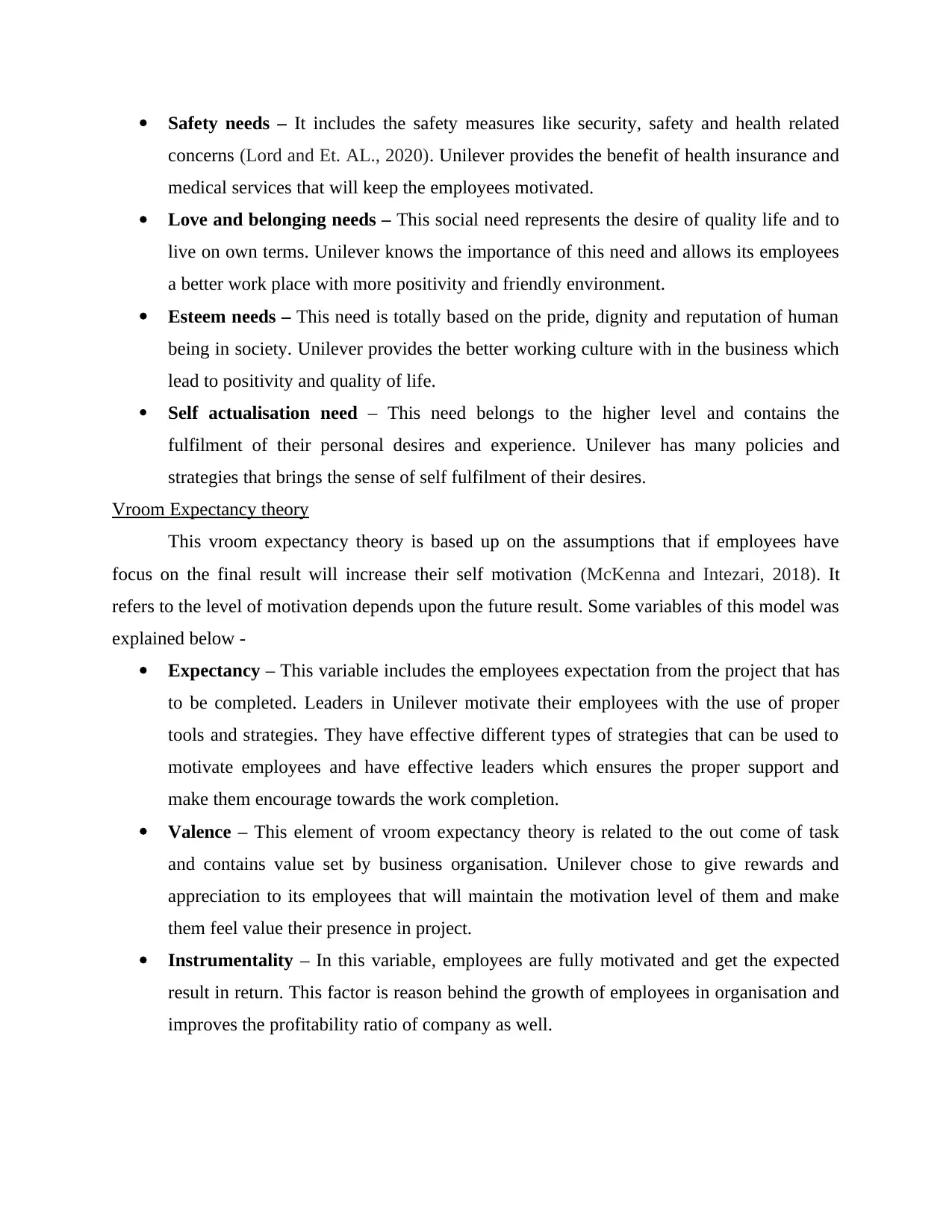
Safety needs – It includes the safety measures like security, safety and health related
concerns (Lord and Et. AL., 2020). Unilever provides the benefit of health insurance and
medical services that will keep the employees motivated.
Love and belonging needs – This social need represents the desire of quality life and to
live on own terms. Unilever knows the importance of this need and allows its employees
a better work place with more positivity and friendly environment.
Esteem needs – This need is totally based on the pride, dignity and reputation of human
being in society. Unilever provides the better working culture with in the business which
lead to positivity and quality of life.
Self actualisation need – This need belongs to the higher level and contains the
fulfilment of their personal desires and experience. Unilever has many policies and
strategies that brings the sense of self fulfilment of their desires.
Vroom Expectancy theory
This vroom expectancy theory is based up on the assumptions that if employees have
focus on the final result will increase their self motivation (McKenna and Intezari, 2018). It
refers to the level of motivation depends upon the future result. Some variables of this model was
explained below -
Expectancy – This variable includes the employees expectation from the project that has
to be completed. Leaders in Unilever motivate their employees with the use of proper
tools and strategies. They have effective different types of strategies that can be used to
motivate employees and have effective leaders which ensures the proper support and
make them encourage towards the work completion.
Valence – This element of vroom expectancy theory is related to the out come of task
and contains value set by business organisation. Unilever chose to give rewards and
appreciation to its employees that will maintain the motivation level of them and make
them feel value their presence in project.
Instrumentality – In this variable, employees are fully motivated and get the expected
result in return. This factor is reason behind the growth of employees in organisation and
improves the profitability ratio of company as well.
concerns (Lord and Et. AL., 2020). Unilever provides the benefit of health insurance and
medical services that will keep the employees motivated.
Love and belonging needs – This social need represents the desire of quality life and to
live on own terms. Unilever knows the importance of this need and allows its employees
a better work place with more positivity and friendly environment.
Esteem needs – This need is totally based on the pride, dignity and reputation of human
being in society. Unilever provides the better working culture with in the business which
lead to positivity and quality of life.
Self actualisation need – This need belongs to the higher level and contains the
fulfilment of their personal desires and experience. Unilever has many policies and
strategies that brings the sense of self fulfilment of their desires.
Vroom Expectancy theory
This vroom expectancy theory is based up on the assumptions that if employees have
focus on the final result will increase their self motivation (McKenna and Intezari, 2018). It
refers to the level of motivation depends upon the future result. Some variables of this model was
explained below -
Expectancy – This variable includes the employees expectation from the project that has
to be completed. Leaders in Unilever motivate their employees with the use of proper
tools and strategies. They have effective different types of strategies that can be used to
motivate employees and have effective leaders which ensures the proper support and
make them encourage towards the work completion.
Valence – This element of vroom expectancy theory is related to the out come of task
and contains value set by business organisation. Unilever chose to give rewards and
appreciation to its employees that will maintain the motivation level of them and make
them feel value their presence in project.
Instrumentality – In this variable, employees are fully motivated and get the expected
result in return. This factor is reason behind the growth of employees in organisation and
improves the profitability ratio of company as well.
Paraphrase This Document
Need a fresh take? Get an instant paraphrase of this document with our AI Paraphraser
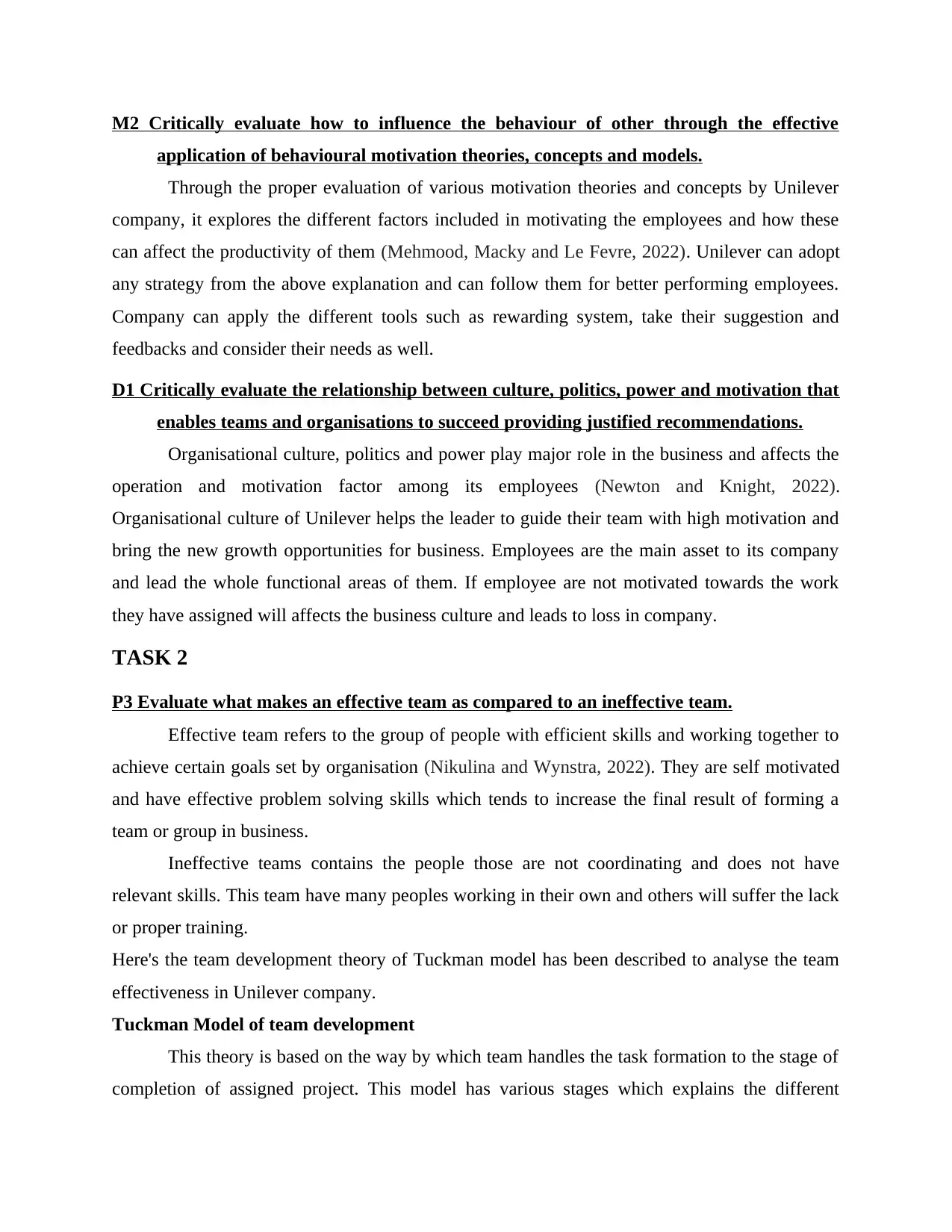
M2 Critically evaluate how to influence the behaviour of other through the effective
application of behavioural motivation theories, concepts and models.
Through the proper evaluation of various motivation theories and concepts by Unilever
company, it explores the different factors included in motivating the employees and how these
can affect the productivity of them (Mehmood, Macky and Le Fevre, 2022). Unilever can adopt
any strategy from the above explanation and can follow them for better performing employees.
Company can apply the different tools such as rewarding system, take their suggestion and
feedbacks and consider their needs as well.
D1 Critically evaluate the relationship between culture, politics, power and motivation that
enables teams and organisations to succeed providing justified recommendations.
Organisational culture, politics and power play major role in the business and affects the
operation and motivation factor among its employees (Newton and Knight, 2022).
Organisational culture of Unilever helps the leader to guide their team with high motivation and
bring the new growth opportunities for business. Employees are the main asset to its company
and lead the whole functional areas of them. If employee are not motivated towards the work
they have assigned will affects the business culture and leads to loss in company.
TASK 2
P3 Evaluate what makes an effective team as compared to an ineffective team.
Effective team refers to the group of people with efficient skills and working together to
achieve certain goals set by organisation (Nikulina and Wynstra, 2022). They are self motivated
and have effective problem solving skills which tends to increase the final result of forming a
team or group in business.
Ineffective teams contains the people those are not coordinating and does not have
relevant skills. This team have many peoples working in their own and others will suffer the lack
or proper training.
Here's the team development theory of Tuckman model has been described to analyse the team
effectiveness in Unilever company.
Tuckman Model of team development
This theory is based on the way by which team handles the task formation to the stage of
completion of assigned project. This model has various stages which explains the different
application of behavioural motivation theories, concepts and models.
Through the proper evaluation of various motivation theories and concepts by Unilever
company, it explores the different factors included in motivating the employees and how these
can affect the productivity of them (Mehmood, Macky and Le Fevre, 2022). Unilever can adopt
any strategy from the above explanation and can follow them for better performing employees.
Company can apply the different tools such as rewarding system, take their suggestion and
feedbacks and consider their needs as well.
D1 Critically evaluate the relationship between culture, politics, power and motivation that
enables teams and organisations to succeed providing justified recommendations.
Organisational culture, politics and power play major role in the business and affects the
operation and motivation factor among its employees (Newton and Knight, 2022).
Organisational culture of Unilever helps the leader to guide their team with high motivation and
bring the new growth opportunities for business. Employees are the main asset to its company
and lead the whole functional areas of them. If employee are not motivated towards the work
they have assigned will affects the business culture and leads to loss in company.
TASK 2
P3 Evaluate what makes an effective team as compared to an ineffective team.
Effective team refers to the group of people with efficient skills and working together to
achieve certain goals set by organisation (Nikulina and Wynstra, 2022). They are self motivated
and have effective problem solving skills which tends to increase the final result of forming a
team or group in business.
Ineffective teams contains the people those are not coordinating and does not have
relevant skills. This team have many peoples working in their own and others will suffer the lack
or proper training.
Here's the team development theory of Tuckman model has been described to analyse the team
effectiveness in Unilever company.
Tuckman Model of team development
This theory is based on the way by which team handles the task formation to the stage of
completion of assigned project. This model has various stages which explains the different
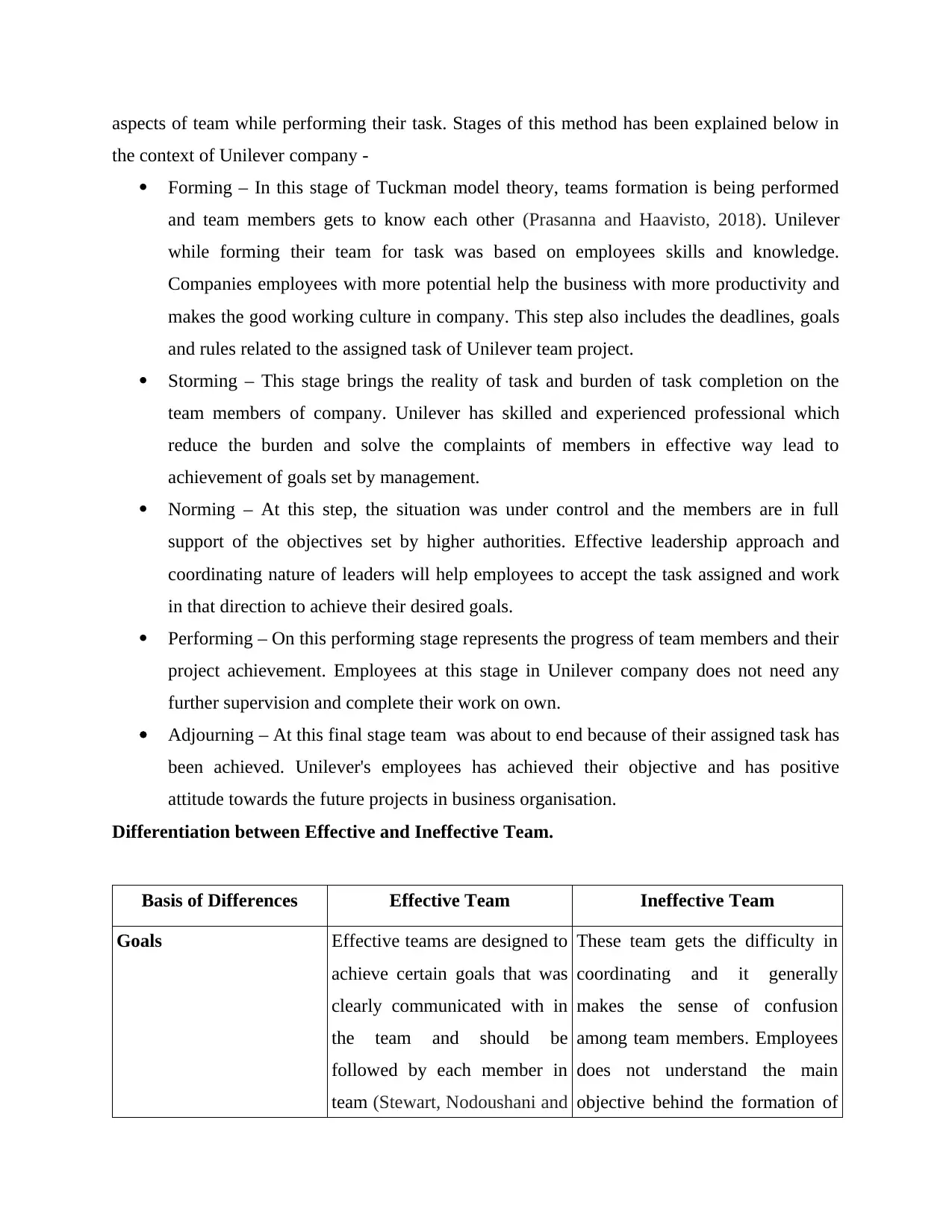
aspects of team while performing their task. Stages of this method has been explained below in
the context of Unilever company -
Forming – In this stage of Tuckman model theory, teams formation is being performed
and team members gets to know each other (Prasanna and Haavisto, 2018). Unilever
while forming their team for task was based on employees skills and knowledge.
Companies employees with more potential help the business with more productivity and
makes the good working culture in company. This step also includes the deadlines, goals
and rules related to the assigned task of Unilever team project.
Storming – This stage brings the reality of task and burden of task completion on the
team members of company. Unilever has skilled and experienced professional which
reduce the burden and solve the complaints of members in effective way lead to
achievement of goals set by management.
Norming – At this step, the situation was under control and the members are in full
support of the objectives set by higher authorities. Effective leadership approach and
coordinating nature of leaders will help employees to accept the task assigned and work
in that direction to achieve their desired goals.
Performing – On this performing stage represents the progress of team members and their
project achievement. Employees at this stage in Unilever company does not need any
further supervision and complete their work on own.
Adjourning – At this final stage team was about to end because of their assigned task has
been achieved. Unilever's employees has achieved their objective and has positive
attitude towards the future projects in business organisation.
Differentiation between Effective and Ineffective Team.
Basis of Differences Effective Team Ineffective Team
Goals Effective teams are designed to
achieve certain goals that was
clearly communicated with in
the team and should be
followed by each member in
team (Stewart, Nodoushani and
These team gets the difficulty in
coordinating and it generally
makes the sense of confusion
among team members. Employees
does not understand the main
objective behind the formation of
the context of Unilever company -
Forming – In this stage of Tuckman model theory, teams formation is being performed
and team members gets to know each other (Prasanna and Haavisto, 2018). Unilever
while forming their team for task was based on employees skills and knowledge.
Companies employees with more potential help the business with more productivity and
makes the good working culture in company. This step also includes the deadlines, goals
and rules related to the assigned task of Unilever team project.
Storming – This stage brings the reality of task and burden of task completion on the
team members of company. Unilever has skilled and experienced professional which
reduce the burden and solve the complaints of members in effective way lead to
achievement of goals set by management.
Norming – At this step, the situation was under control and the members are in full
support of the objectives set by higher authorities. Effective leadership approach and
coordinating nature of leaders will help employees to accept the task assigned and work
in that direction to achieve their desired goals.
Performing – On this performing stage represents the progress of team members and their
project achievement. Employees at this stage in Unilever company does not need any
further supervision and complete their work on own.
Adjourning – At this final stage team was about to end because of their assigned task has
been achieved. Unilever's employees has achieved their objective and has positive
attitude towards the future projects in business organisation.
Differentiation between Effective and Ineffective Team.
Basis of Differences Effective Team Ineffective Team
Goals Effective teams are designed to
achieve certain goals that was
clearly communicated with in
the team and should be
followed by each member in
team (Stewart, Nodoushani and
These team gets the difficulty in
coordinating and it generally
makes the sense of confusion
among team members. Employees
does not understand the main
objective behind the formation of
⊘ This is a preview!⊘
Do you want full access?
Subscribe today to unlock all pages.

Trusted by 1+ million students worldwide
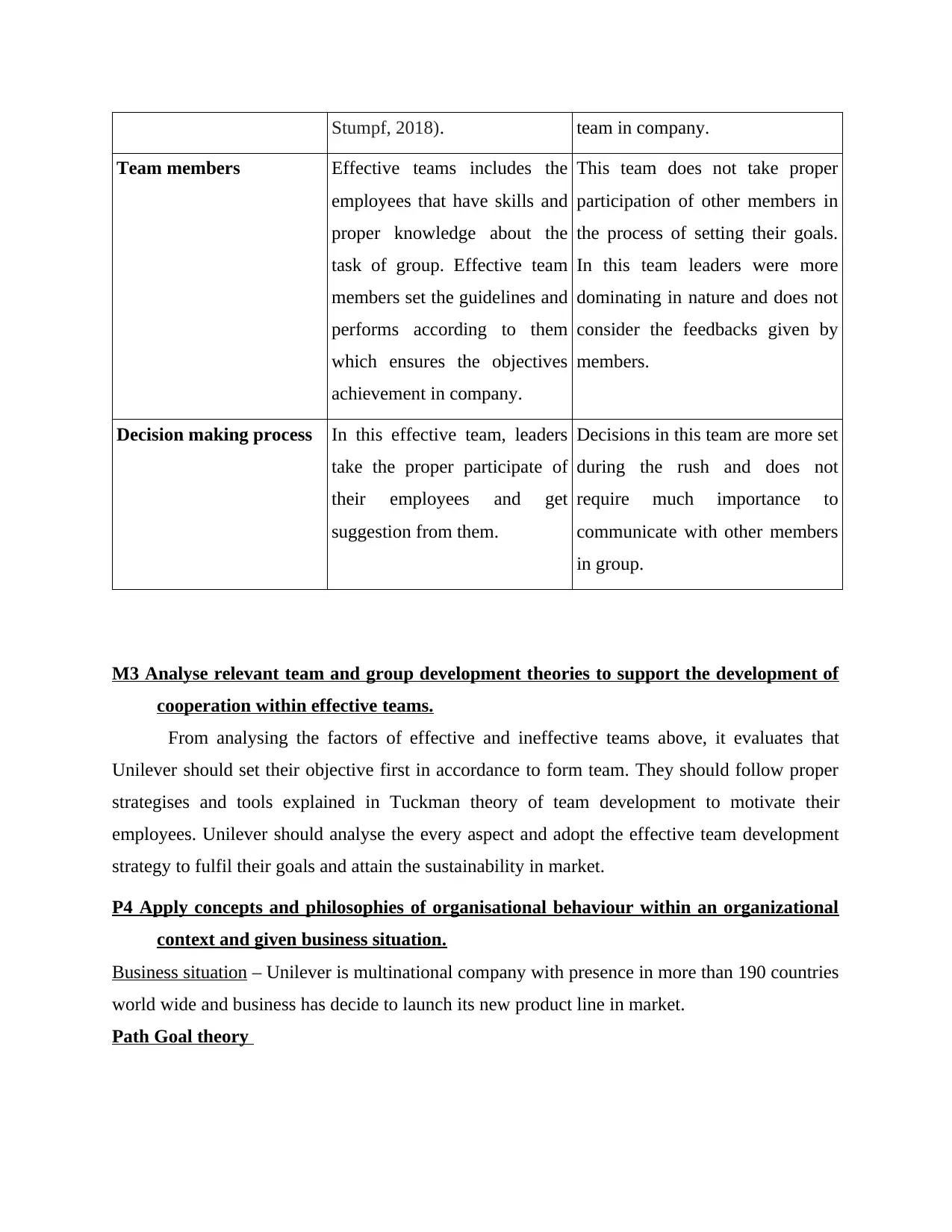
Stumpf, 2018). team in company.
Team members Effective teams includes the
employees that have skills and
proper knowledge about the
task of group. Effective team
members set the guidelines and
performs according to them
which ensures the objectives
achievement in company.
This team does not take proper
participation of other members in
the process of setting their goals.
In this team leaders were more
dominating in nature and does not
consider the feedbacks given by
members.
Decision making process In this effective team, leaders
take the proper participate of
their employees and get
suggestion from them.
Decisions in this team are more set
during the rush and does not
require much importance to
communicate with other members
in group.
M3 Analyse relevant team and group development theories to support the development of
cooperation within effective teams.
From analysing the factors of effective and ineffective teams above, it evaluates that
Unilever should set their objective first in accordance to form team. They should follow proper
strategises and tools explained in Tuckman theory of team development to motivate their
employees. Unilever should analyse the every aspect and adopt the effective team development
strategy to fulfil their goals and attain the sustainability in market.
P4 Apply concepts and philosophies of organisational behaviour within an organizational
context and given business situation.
Business situation – Unilever is multinational company with presence in more than 190 countries
world wide and business has decide to launch its new product line in market.
Path Goal theory
Team members Effective teams includes the
employees that have skills and
proper knowledge about the
task of group. Effective team
members set the guidelines and
performs according to them
which ensures the objectives
achievement in company.
This team does not take proper
participation of other members in
the process of setting their goals.
In this team leaders were more
dominating in nature and does not
consider the feedbacks given by
members.
Decision making process In this effective team, leaders
take the proper participate of
their employees and get
suggestion from them.
Decisions in this team are more set
during the rush and does not
require much importance to
communicate with other members
in group.
M3 Analyse relevant team and group development theories to support the development of
cooperation within effective teams.
From analysing the factors of effective and ineffective teams above, it evaluates that
Unilever should set their objective first in accordance to form team. They should follow proper
strategises and tools explained in Tuckman theory of team development to motivate their
employees. Unilever should analyse the every aspect and adopt the effective team development
strategy to fulfil their goals and attain the sustainability in market.
P4 Apply concepts and philosophies of organisational behaviour within an organizational
context and given business situation.
Business situation – Unilever is multinational company with presence in more than 190 countries
world wide and business has decide to launch its new product line in market.
Path Goal theory
Paraphrase This Document
Need a fresh take? Get an instant paraphrase of this document with our AI Paraphraser
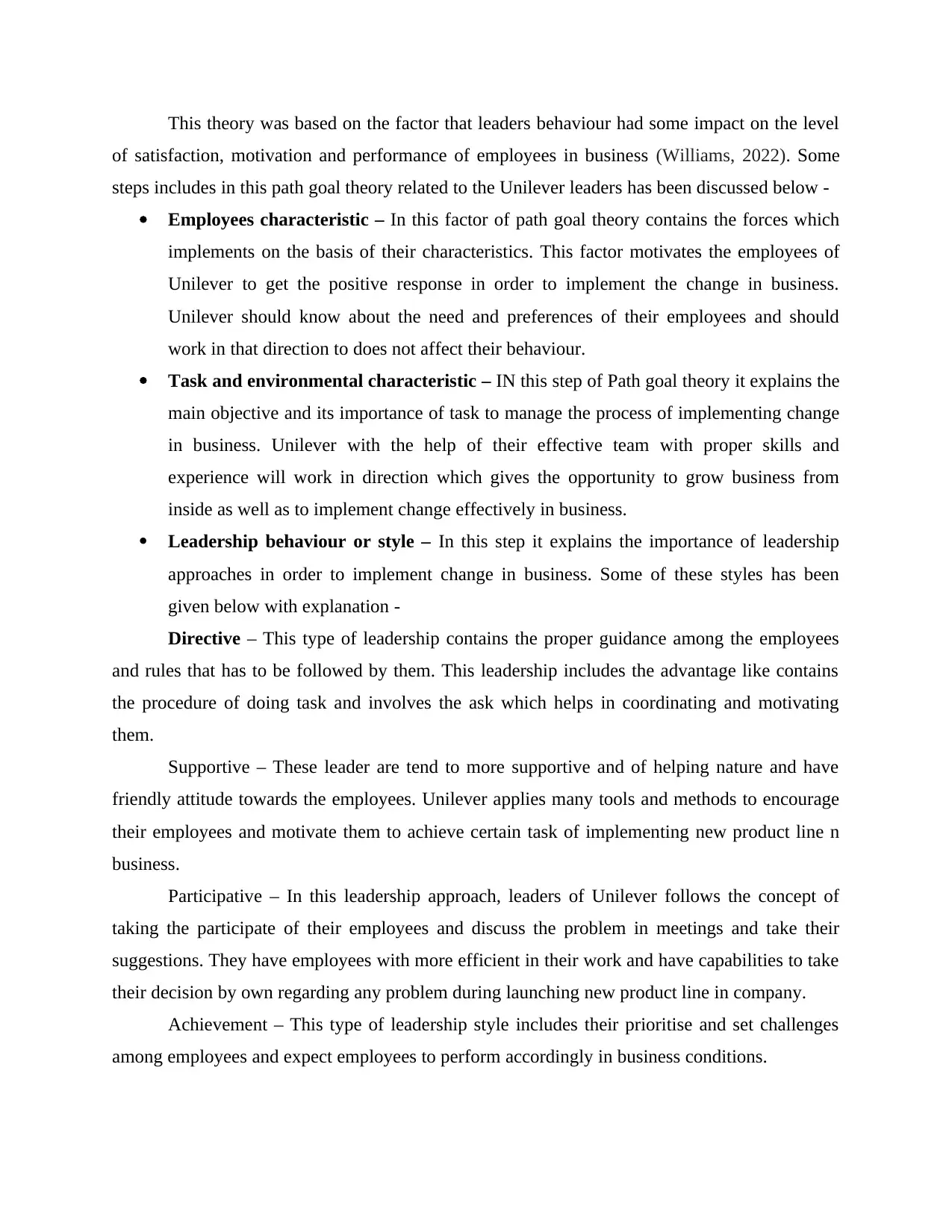
This theory was based on the factor that leaders behaviour had some impact on the level
of satisfaction, motivation and performance of employees in business (Williams, 2022). Some
steps includes in this path goal theory related to the Unilever leaders has been discussed below -
Employees characteristic – In this factor of path goal theory contains the forces which
implements on the basis of their characteristics. This factor motivates the employees of
Unilever to get the positive response in order to implement the change in business.
Unilever should know about the need and preferences of their employees and should
work in that direction to does not affect their behaviour.
Task and environmental characteristic – IN this step of Path goal theory it explains the
main objective and its importance of task to manage the process of implementing change
in business. Unilever with the help of their effective team with proper skills and
experience will work in direction which gives the opportunity to grow business from
inside as well as to implement change effectively in business.
Leadership behaviour or style – In this step it explains the importance of leadership
approaches in order to implement change in business. Some of these styles has been
given below with explanation -
Directive – This type of leadership contains the proper guidance among the employees
and rules that has to be followed by them. This leadership includes the advantage like contains
the procedure of doing task and involves the ask which helps in coordinating and motivating
them.
Supportive – These leader are tend to more supportive and of helping nature and have
friendly attitude towards the employees. Unilever applies many tools and methods to encourage
their employees and motivate them to achieve certain task of implementing new product line n
business.
Participative – In this leadership approach, leaders of Unilever follows the concept of
taking the participate of their employees and discuss the problem in meetings and take their
suggestions. They have employees with more efficient in their work and have capabilities to take
their decision by own regarding any problem during launching new product line in company.
Achievement – This type of leadership style includes their prioritise and set challenges
among employees and expect employees to perform accordingly in business conditions.
of satisfaction, motivation and performance of employees in business (Williams, 2022). Some
steps includes in this path goal theory related to the Unilever leaders has been discussed below -
Employees characteristic – In this factor of path goal theory contains the forces which
implements on the basis of their characteristics. This factor motivates the employees of
Unilever to get the positive response in order to implement the change in business.
Unilever should know about the need and preferences of their employees and should
work in that direction to does not affect their behaviour.
Task and environmental characteristic – IN this step of Path goal theory it explains the
main objective and its importance of task to manage the process of implementing change
in business. Unilever with the help of their effective team with proper skills and
experience will work in direction which gives the opportunity to grow business from
inside as well as to implement change effectively in business.
Leadership behaviour or style – In this step it explains the importance of leadership
approaches in order to implement change in business. Some of these styles has been
given below with explanation -
Directive – This type of leadership contains the proper guidance among the employees
and rules that has to be followed by them. This leadership includes the advantage like contains
the procedure of doing task and involves the ask which helps in coordinating and motivating
them.
Supportive – These leader are tend to more supportive and of helping nature and have
friendly attitude towards the employees. Unilever applies many tools and methods to encourage
their employees and motivate them to achieve certain task of implementing new product line n
business.
Participative – In this leadership approach, leaders of Unilever follows the concept of
taking the participate of their employees and discuss the problem in meetings and take their
suggestions. They have employees with more efficient in their work and have capabilities to take
their decision by own regarding any problem during launching new product line in company.
Achievement – This type of leadership style includes their prioritise and set challenges
among employees and expect employees to perform accordingly in business conditions.
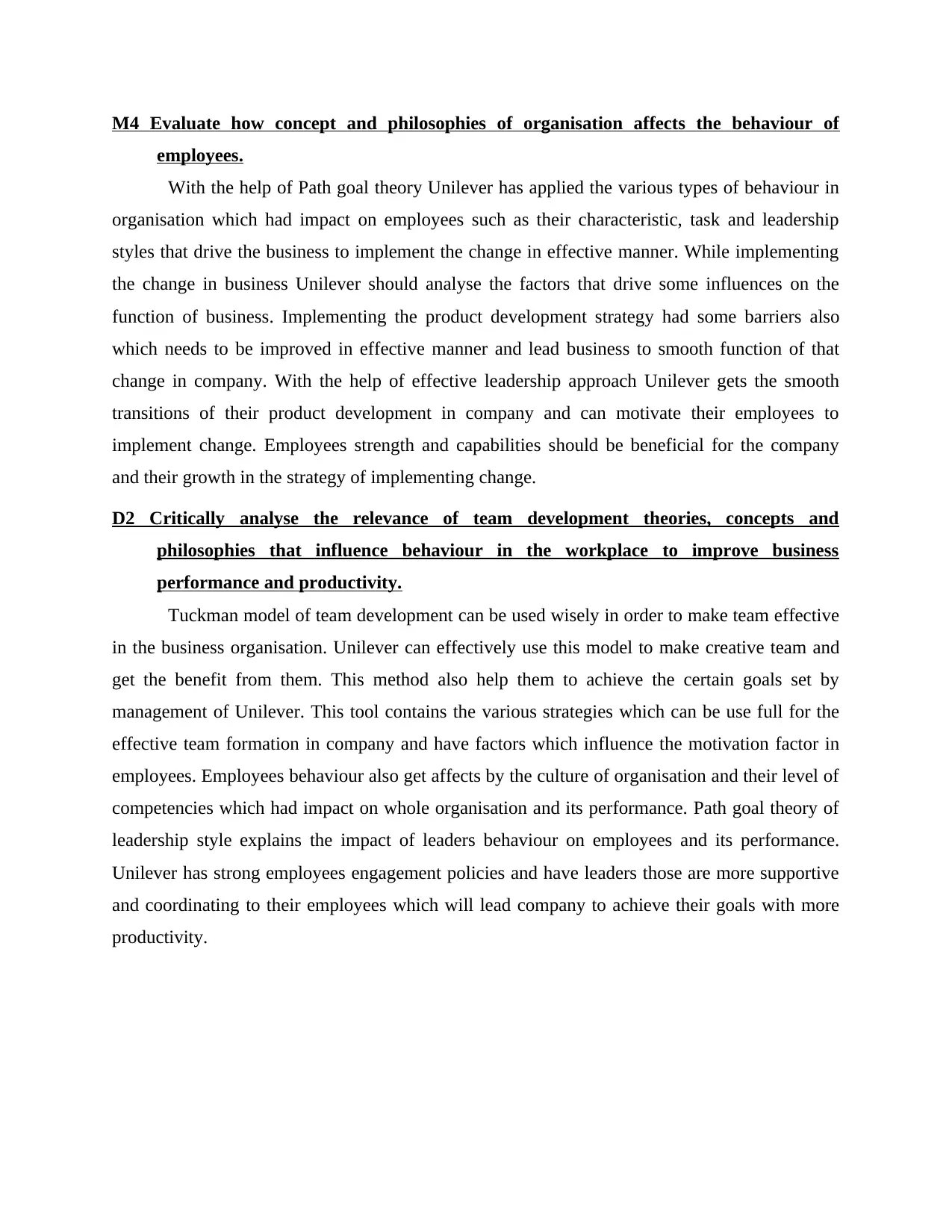
M4 Evaluate how concept and philosophies of organisation affects the behaviour of
employees.
With the help of Path goal theory Unilever has applied the various types of behaviour in
organisation which had impact on employees such as their characteristic, task and leadership
styles that drive the business to implement the change in effective manner. While implementing
the change in business Unilever should analyse the factors that drive some influences on the
function of business. Implementing the product development strategy had some barriers also
which needs to be improved in effective manner and lead business to smooth function of that
change in company. With the help of effective leadership approach Unilever gets the smooth
transitions of their product development in company and can motivate their employees to
implement change. Employees strength and capabilities should be beneficial for the company
and their growth in the strategy of implementing change.
D2 Critically analyse the relevance of team development theories, concepts and
philosophies that influence behaviour in the workplace to improve business
performance and productivity.
Tuckman model of team development can be used wisely in order to make team effective
in the business organisation. Unilever can effectively use this model to make creative team and
get the benefit from them. This method also help them to achieve the certain goals set by
management of Unilever. This tool contains the various strategies which can be use full for the
effective team formation in company and have factors which influence the motivation factor in
employees. Employees behaviour also get affects by the culture of organisation and their level of
competencies which had impact on whole organisation and its performance. Path goal theory of
leadership style explains the impact of leaders behaviour on employees and its performance.
Unilever has strong employees engagement policies and have leaders those are more supportive
and coordinating to their employees which will lead company to achieve their goals with more
productivity.
employees.
With the help of Path goal theory Unilever has applied the various types of behaviour in
organisation which had impact on employees such as their characteristic, task and leadership
styles that drive the business to implement the change in effective manner. While implementing
the change in business Unilever should analyse the factors that drive some influences on the
function of business. Implementing the product development strategy had some barriers also
which needs to be improved in effective manner and lead business to smooth function of that
change in company. With the help of effective leadership approach Unilever gets the smooth
transitions of their product development in company and can motivate their employees to
implement change. Employees strength and capabilities should be beneficial for the company
and their growth in the strategy of implementing change.
D2 Critically analyse the relevance of team development theories, concepts and
philosophies that influence behaviour in the workplace to improve business
performance and productivity.
Tuckman model of team development can be used wisely in order to make team effective
in the business organisation. Unilever can effectively use this model to make creative team and
get the benefit from them. This method also help them to achieve the certain goals set by
management of Unilever. This tool contains the various strategies which can be use full for the
effective team formation in company and have factors which influence the motivation factor in
employees. Employees behaviour also get affects by the culture of organisation and their level of
competencies which had impact on whole organisation and its performance. Path goal theory of
leadership style explains the impact of leaders behaviour on employees and its performance.
Unilever has strong employees engagement policies and have leaders those are more supportive
and coordinating to their employees which will lead company to achieve their goals with more
productivity.
⊘ This is a preview!⊘
Do you want full access?
Subscribe today to unlock all pages.

Trusted by 1+ million students worldwide
1 out of 14
Related Documents
Your All-in-One AI-Powered Toolkit for Academic Success.
+13062052269
info@desklib.com
Available 24*7 on WhatsApp / Email
![[object Object]](/_next/static/media/star-bottom.7253800d.svg)
Unlock your academic potential
Copyright © 2020–2026 A2Z Services. All Rights Reserved. Developed and managed by ZUCOL.


